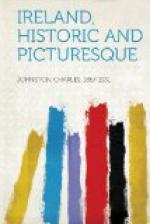Meave, whose power and genius overtopped her lord Ailill, received the exiled king gladly, and put many honors upon him, holding him as the pillar of her army, with the two thousand men of the Ulaid who came with him;—those who had fought for him against the party of Concobar. At Cruacan, on the hillside, with the lakes of the Great River all around them, with the sun setting red behind the Curlew hills, with green meadows and beech-woods to gladden them, Meave and Ailill kept their court, and thence they sent many forays against Emain of Maca and Concobar, with Fergus the fallen king ever raging in the van, and, for the wrong that was done him, working measureless wrong on his own kingdom and the kingdom of his fathers.
After many a foray had gone forth against Ulad, crossing the level plains, it befell that Meave and Ailill her lord disputed between them as to which had the greatest wealth; nor would either yield until their most precious possessions had been brought and matched the one against the other. Their jewels of gold, wonderfully wrought, and set with emeralds and beryls and red carbuncles, were brought forth, their crescents for the brow, with hammered tracery upon them, their necklets and torques, like twisted ribbons of gold, their bracelets and arm-rings set with gold, their gems of silver and all their adornments, cloaks of scarlet and blue and purple, were all brought, and no advantage in the one was found over the other. Their battle-steeds also were brought, their horses for chariots; and likewise their herds of lowing wealth, their sheep with soft fleeces. When the cattle were driven up before them, it was found that among the herds of Ailill was one bull, matchless, with white horns shining and polished; and equal to this bull was none among the herds of the queen. She would not admit her lord’s advantage, but sent forthwith to seek where another bull like the bull of Ailill might be found, and tidings were brought to her of the brown bull of Cuailgne,—of Cuailgne named after a chief of the Sons of Milid, fallen ages ago in the pursuit of the De Danaans, when the De Danaans retreated before the Sons of Milid from the southern headland of Slieve Mish to the ford at green Tailten by the Boyne, and thence further northwards to where Cuailgne of the Sons of Milid was killed. At that same place had grown up a dwelling with a fortress, and there was the brown bull that Meave heard the report of. She sent, therefore, and her embassy bore orders to Daire, the owner of the bull, asking that the bull might be sent to her for a year, and offering fifty heifers in payment. Daire received her messengers well, and willingly consented to her request; but the messengers of Meave from feasting fell to drinking, from drinking to boasting; one of them declaring that it was a small thing that Daire had granted the request, since they themselves would have compelled him, even unwillingly, and would have driven off the brown bull by force. The taunt stung Daire, after his hospitality, and in wrath he sent them forth empty-handed, and so they came slighted to Meave.




